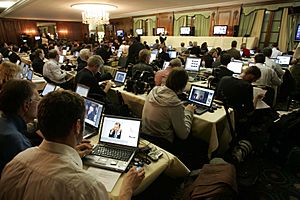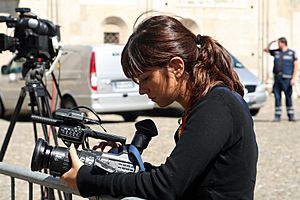Journalism facts for kids
Journalism is all about creating and sharing news reports about recent events. It's the job of a journalist to gather information and tell stories. You can find journalism in many forms, like newspapers, magazines, television, radio, and the Internet. Long ago, there were even newsreels shown in movie theaters!
How journalism works can be different in various countries. In some places, the government controls the news. This means the news media might not be fully free to report everything. In other countries, news organizations are independent. They work as private businesses and aim to make a profit.
The rise of the Internet and smartphones has changed how people get their news. Many now read news on e-readers, smartphones, and other devices. Fewer people are buying traditional newspapers or magazines. News companies have seen their print sales go down. However, their digital sales are growing.
How News is Made
When journalists write stories, they try to be fair and balanced. Some stories share the writer's own thoughts. Others aim to be neutral and show different viewpoints. In a newspaper, it's usually clear which stories are opinions and which are just facts. Online, it can be harder to tell. Readers should look closely at headings and how the page is designed. This helps them understand what the journalist intends.
Journalists are expected to be objective and neutral. They follow rules of ethics to make sure they report fairly. They try their best to show all important points of view.
Types of Journalism
There are many kinds of journalism. Each type might be for a different audience. A single newspaper or website can have many forms of journalism. Different sections might focus on different topics or styles.
Some common types include:
- Access journalism – This is when journalists avoid reporting things that might upset their hosts or powerful people.
- Citizen journalism – This is when everyday people help report the news.
- Advocacy journalism – This type of writing tries to convince readers to agree with a certain idea or viewpoint.
- Broadcast journalism – This is news made for radio or television.
- Data journalism – This involves finding stories in numbers and using numbers to tell stories. Journalists might use data to support their reports. They also report on how data is used or misused.
- Drone journalism – This uses drones to film news events from the sky.
- Interactive journalism – This is online journalism that lets readers interact with the content.
- Investigative journalism – This is deep reporting that uncovers big problems in society. It often helps solve these problems.
- Photojournalism – This is telling true stories using pictures.
- Tabloid journalism – This writing is often light and entertaining. It is sometimes seen as less serious than mainstream news.
- Yellow journalism (or sensationalism) – This type of reporting uses exaggerated claims or rumors. It tries to make stories sound more exciting than they are.
What is Fake News?
"Fake news" is information that is purposely untrue. It can spread very quickly on social media or through fake news websites. It is often published to trick readers. This is usually done to help a certain cause, group, or person.
For example, during the 2016 United States presidential election, a lot of fake news spread online. Stories that were not true, like conspiracy theories or hoaxes, were shared as if they were real news. One example was a made-up story about Hillary Clinton's emails. It was published by a newspaper that didn't even exist.
Many people blamed Facebook for spreading these false stories. Mark Zuckerberg, the head of Facebook, said that the company played a part in this problem. He spoke about it in a hearing in April 2018.
Images for kids
-
Photo and broadcast journalists interviewing a government official after a building collapse in Dar es Salaam, Tanzania. March 2013.
-
Walter Lippmann in 1914
-
Journalist interviewing a cosplayer
-
News photographers and reporters waiting behind a police line in New York City, in May 1994
See also
 In Spanish: Periodismo para niños
In Spanish: Periodismo para niños
 | Georgia Louise Harris Brown |
 | Julian Abele |
 | Norma Merrick Sklarek |
 | William Sidney Pittman |











